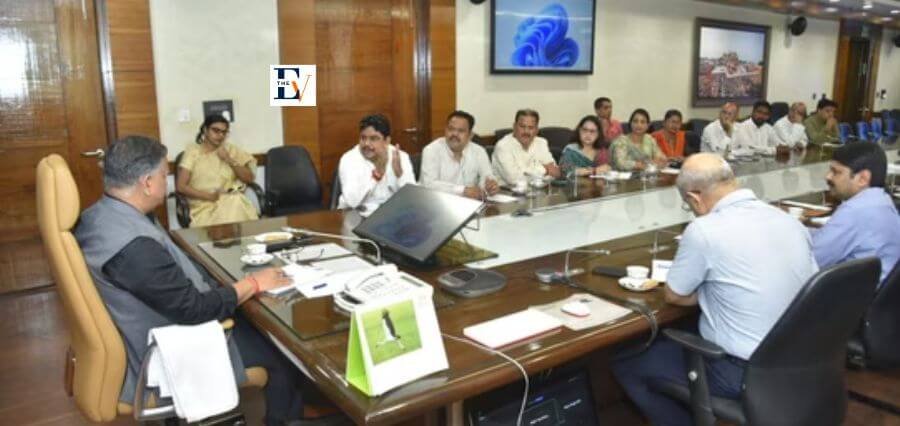The contemporary domain of higher education is increasingly prioritizing women’s empowerment. Institutions are developing specialized programs in leadership, entrepreneurship, and gender studies. These curricula equip women with the tools and knowledge to navigate societal challenges, advocate for themselves and others, and become agents of positive social transformation.
Acknowledging this imperative, the School of Design at Mody University has articulated a clear and focused vision to cater for the needs of the industry by nurturing highly skilled professionals. These individuals are destined to become sought-after professionals and entrepreneurs equipped with the ability to meet global demands. This becomes possible with the ideal foundation laid by the School of Design.
Mody University was founded in 1998 by Shri R.P. Mody, a true visionary who established the university solely for women, with the aim of applying charitable qualities to the social and psychological advancement of the female society. This enabled him to disseminate his vision through useful infrastructure.
The university disseminates ideas that can significantly aid the public in structuring knowledge and information in a scientific fashion. This endeavour contributes to shaping a contemporary understanding of knowledge acquisition within the university in the 21st century.
The objective of the School of Design is to cultivate exceptional female leaders, technocrats, and social innovators through enhanced education and expanded knowledge, empowering women to develop pioneering abilities rooted in creativity, research, integrity, environmental awareness, as well as social and ethical sensitivity.
Shaping Impeccable Design Policies
With her passion for the intersection of design, innovation, and policy, the Dean of the School of Design—Prof (Dr.) Smriti Agarwal brings a wealth of interdisciplinary expertise to her role. Prof (Dr.) Smriti is committed to advancing collective efforts in design education with a diverse background spanning academia, professional practice, and policymaking. She aspires to shape design policies and pedagogical infrastructures by collaborating with top professionals globally.
Prof (Dr.) Smriti’s goal is to empower the next generation of designers and end-users, enabling them to navigate the evolving landscape of technology and drive innovation in design education. Leading the School of Design, she ensures that every participant has access to physical and virtual environments conducive to holistic learning and development.
The school’s pedagogy emphasizes both conceptual and experiential learning supported by interdisciplinary curricula that provide learners with creative, critical, and contemporary perspectives across various arts and design disciplines. This approach enables students to envision imaginary scenarios and effectively solve real-world problems.
Thus, as designers they contribute to their respective ields by preserving their culture, creating the future, and nurturing nature.
Vision
“Committed to excellence, we seek to advance education and enhance knowledge to develop transformative skills in women fuelled with innovation, research, integrity, environmental consciousness, social and ethical sensitivity to create the finest women leaders, technocrats and social innovators.”
Mission
The mission is:
- “To create a supportive ambience in which new ideas and innovation flourish, and from which the leaders and innovators of tomorrow emerge.
- To address contemporary issues and provide solutions at the local, regional, national and global level.
- Advance education and collaborative research that transform pupils through rigorous coursework and intellectual delivery.
- Create a sustainable ecosystem.
- Invent new knowledge by engaging in cutting-edge research and academic growth.
- Undertake collaborative projects which offer opportunities for long-term interaction with academia and industry.
- Develop human potential to its fullest extent so that intellectually capable and imaginatively gifted leaders can serve in a diverse range of professions.”
Overcoming Challenges
The university has faced significant challenges over the course. Firstly, establishing an all-women’s university in the state of Rajasthan, known for its extreme weather conditions, posed a formidable obstacle. Additionally, the onset of the COVID-19 pandemic led to the closure of the entire institute in adherence to strict government guidelines.
However, the institute successfully overcame these challenges through proactive measures. It embarked on an extensive educational campaign, emphasizing the pivotal importance of women’s education to the broader community.
To combat the harsh weather conditions, the School of Design spearheaded an initiative to plant thousands of trees, transforming the campus into a verdant and tranquil environment. Furthermore, in response to the disruptions caused by the pandemic, the institute swiftly adopted a hybrid teaching model, ensuring continuity in learning despite the constraints.
In terms of infrastructure, the institute boasts state-of-the-art facilities including smart classrooms equipped with cutting-edge technology to enhance the educational experience. Moreover, its CAD software and printing labs cater to the technological needs of students, providing them with essential tools for academic and professional growth.
The School of Design stands out for its commitment to imparting global perspectives in design and exploring diverse movements that have shaped contemporary design. Students are exposed to avant-garde theories such as biomimicry and sustainability, as well as emerging technologies like AI integration in nanotechnology, preparing them to tackle the challenges of the modern world.
Feathers in the Cap
The institute has embarked on an inspiring journey, marked by several notable milestones:
- Establishment by the Rajasthan State Legislature.
- Recognition by the University Grants Commission (UGC).
- Approval from the All-India Council for Technical Education (AICTE).
- Accreditation by the Bar Council of India (BCI).
- Accreditation by the National Assessment and Accreditation Council (NAAC) for Mody University of Science and Technology.
- Accreditation by the Accreditation Board for Engineering and Technology (ABET) for Mody School of Engineering & Technology.
- Recognition and registration by the Scientific and Industrial Research Organization (SIRO) for Mody University of Science and Technology.
- Membership in the Association of Indian Universities for Mody University of Science and Technology.
- Membership in The Association to Advance Collegiate Schools of Business for Mody University of Science and Technology.
Meeting the Changing Needs
The institute arranges training as well as expert lectures & classes by top industry experts to update students with changing industry trends. Some of its collaborations include Zara India, Wings Lifestyle, Livespace, weavers’ Association, Ministry of Textiles, Environmental Science Board, and many more.
Each academic year at the design school features a distinct set of faculty members who serve as mentors for students. These mentors provide a platform for students to share both academic and non-academic feedback fostering an environment of continuous improvement and support.
The university’s incubation cell organises an annual Ideathon, providing students with a platform to pitch their ideas to industry experts. During this event, seasoned professionals offer invaluable guidance, refining the concepts and charting a path for a more robust entrepreneurial journey. Additionally, they selectively fund promising ideas, catalyzing their development and fostering innovation within the student community.
Continuing the Voyage to Excellence
The institute aims to continue its search for excellence in the future too. It is planning to implement the following strategies to achieve this objective:
- Fostering a nurturing environment conducive to the cultivation of new ideas and innovation, nurturing the leaders and innovators of the future.
- Tackling contemporary challenges and offering solutions at various scales, spanning from local to global contexts.
- Advancing education and collaborative research endeavors that empower students through rigorous coursework and intellectual engagement.
- Establishing a sustainable ecosystem that supports long-term viability and growth.
- Pioneering the exploration of new knowledge through cutting-edge research and academic pursuits.
- Undertaking collaborative initiatives that foster ongoing interaction between academia and industry, facilitating mutual growth and innovation.
- Maximizing human potential by nurturing intellectually capable and creatively inclined individuals to serve across a diverse spectrum of professions.





